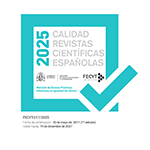Antisociológicas Arawá: modos de relación en Amazonia occidental
Resumen
La zona interfluvial situada entre las cuencas de los ríos Purús y Juruá, en la Amazonia occidental brasileña, se ha caracterizado por la baja densidad de investigaciones históricas, arqueológicas y lingüísticas. En ella se concentra un circuito de pueblos indígenas que integran la familia lingüística Arawá y que, durante los últimos 15 años, han constituido el centro de atención de nuevas etnografías. Este artículo desarrolla un cruzamiento entre los análisis de investigaciones antropológicas recientes en esta región y los resultados del trabajo etnográfico de campo junto a dos grupos del conjunto Arawá: los Banawá y los Suruwaha, con foco especial en los procesos de constitución de colectivos. Sus formas de socialidad manifiestan una especie de inconformidad con las fronteras étnicas, con movimientos de resistencia a morfologías sociales o delimitaciones sociológicas estables. Los Arawá desarrollan un cromatismo en sus relaciones que nos conduce a reconocer en ellos una antisociología de las relaciones-entre-si más que un conjunto de grupos étnicos sólidamente constituidos.
Descargas
Descarga artículo
Licencia
La Revista de Antropología Social, para fomentar el intercambio global del conocimiento, facilita el acceso sin restricciones a sus contenidos desde el momento de su publicación en la presente edición electrónica, y por eso es una revista de acceso abierto. Los originales publicados en esta revista son propiedad de la Universidad Complutense de Madrid y es obligatorio citar su procedencia en cualquier reproducción total o parcial. Todos los contenidos se distribuyen bajo una licencia de uso y distribución Creative Commons Reconocimiento 4.0 (CC BY 4.0). Esta circunstancia ha de hacerse constar expresamente de esta forma cuando sea necesario. Puede consultar la versión informativa y el texto legal de la licencia.












